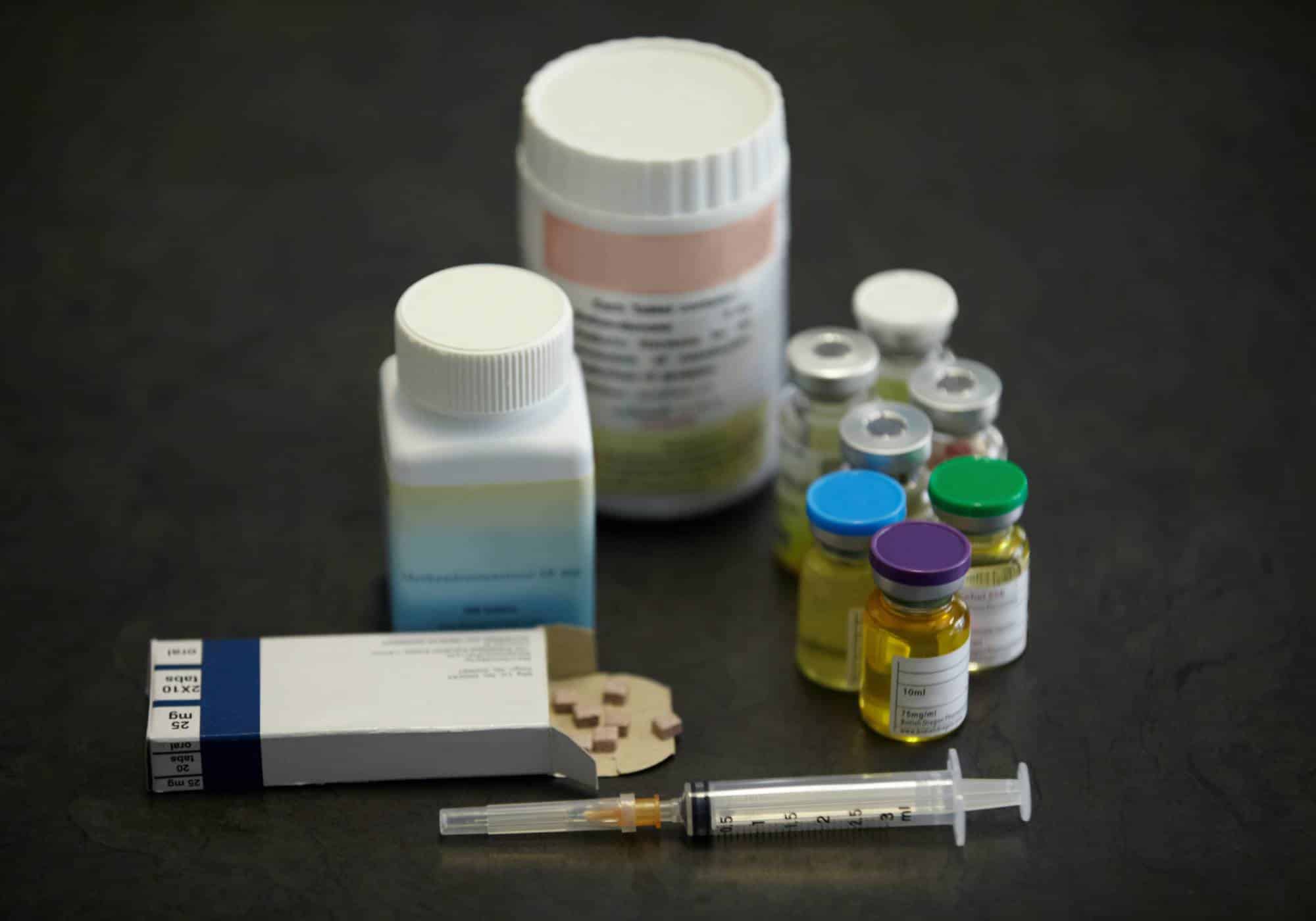If you’re grappling with codeine addiction, remember, recovery is possible and you don’t have to face it alone. Taking the step to seek help is crucial for reclaiming your life.
Codeine is a prescription opioid used primarily for moderate pain relief, such as after an injury or surgery, or for chronic pain when other painkillers like paracetamol or ibuprofen have failed. When used correctly and under medical supervision, codeine effectively alleviates pain and enhances quality of life.
But is codeine addictive? Yes, as an opioid, codeine has a potential for addiction. Abuse can lead to withdrawal symptoms, overdose, and long-term addiction. This guide provides an overview of codeine, including how it’s misused, symptoms of overdose, and the associated risks, including those from combining it with alcohol or other substances.
You will learn about the signs of codeine addiction, the adverse effects of its use, and how addiction to this medication is treated to help those suffering find a path to recovery.
What is Codeine?
A member of the opiate class of narcotic prescription medications, codeine is derived from a member of the opium poppy plant. Codeine is an opioid classified as a Schedule II drug, indicating its high potential for abuse, dependence, and addiction, even though it is used medically for pain relief and as a cough suppressant. It functions by activating opioid receptors in the brain and body, which modifies pain perception and boosts dopamine levels.
While codeine offers considerable relief for individuals experiencing pain or severe coughs, the increase in dopamine in the brain’s reward center may encourage continued use, potentially leading to opioid use disorder.
Side Effects of Codeine
Codeine, available in various formulations like codeine with acetaminophen or promethazine, presents a range of common side effects including:
- Sedation or drowsiness
- Impaired mental and physical capabilities
- Dizziness or lightheadedness
- Sweating
- Dry mouth
- Nausea and vomiting
- Constipation
- Shortness of breath
Additional side effects may occur depending on the combination of substances, such as:
- Dysphoria or general dissatisfaction
- Abdominal pain
- Itching (pruritus)
- Development of physiological dependence and withdrawal symptoms
- Risk of addiction
Particularly, misuse of codeine combined with high doses of acetaminophen can lead to severe liver failure, sometimes fatal. Misuse of combinations with aspirin may increase risks of bleeding, coagulation abnormalities, and metabolic acidosis.
In cases of overdose, like with other opioids, codeine can cause severe respiratory depression, arrest, coma, brain damage, or death.
Why is codeine addictive?
Despite being perceived as a milder opiate, codeine still possesses significant addictive potential. Often underestimated due to its lower potency compared to other opioids, codeine can lead individuals into a false sense of security, making it seem less dangerous. However, this misconception can contribute to its misuse.
Codeine acts on the central nervous system and stimulates the brain’s reward pathways, fostering a desire to continue using the substance to recreate its effects. This activation of the brain’s reward system is what underlies the development of addiction to codeine and other opioids.
Due to its lower potency, codeine can serve as an initial step towards the use of stronger opioids, as users may seek more potent drugs when they develop tolerance to codeine’s effects. Furthermore, the risk escalates when codeine is used in conjunction with other central nervous system depressants like alcohol or benzodiazepines, enhancing its effects and increasing the dangers of overdose.
Causes of Codeine Addiction
Codeine addiction, like other substance use disorders, lacks a single definitive cause. Rather, it emerges from a complex interplay of factors. Research highlights that genetics, family background, psychological health, life experiences, and social circles all contribute to the risk of developing an addiction.
Moreover, drugs known for causing physical dependence typically have a high addiction potential. This connection is due to the challenging withdrawal symptoms associated with such substances, which make discontinuation particularly tough. Individuals experiencing these withdrawal symptoms often revert to using the drug as a rapid relief method. This cycle of using the drug to alleviate withdrawal symptoms, despite adverse consequences, is a core feature of addiction behavior.
Signs and Symptoms of Codeine Addiction
Codeine addiction can manifest through various signs and symptoms, impacting a person’s physical health, psychological state, and behavior. While initial use of codeine might bring feelings of euphoria and relaxation, addiction often leads to using the drug merely to function normally.
Physical Symptoms of Codeine Addiction
- Dizziness
- Constricted (pinpoint) pupils
- Slowed breathing
- Bluish lips or fingernails
- Persistent itching
- Sexual dysfunction
- General lethargy
Psychological Symptoms of Codeine Addiction
- Frequent confusion or periods of delirium
- Depression
- Increased anxiety
- Hallucinations
- Delusional thinking
Behavioral Signs of Codeine Addiction
- Using codeine for minor issues like headaches
- Frequently visiting doctors to get new codeine prescriptions
- Secrecy surrounding drug use
- Social withdrawal and isolation
- Financial problems due to spending on codeine
- Exaggerating symptoms to obtain prescriptions
- A noticeable decline in work performance or increased sick days
- Illegally obtaining codeine when prescriptions are unavailable
- Developing a tolerance and needing increasingly larger doses to achieve the same effects
These signs can help identify if someone is struggling with an addiction to codeine, prompting the need for intervention and support to address their condition.

Risk Factors for Codeine Addiction
Risk factors for developing codeine addiction are complex and multifaceted. While a single cause for addiction remains unclear, it is generally understood to result from a combination of genetic, biological, environmental, and psychological factors:
- Genetic Factors: Addiction can be hereditary. Individuals with a first-degree relative, such as a parent, who have struggled with substance addiction are at a heightened risk of developing similar issues.
- Biological Factors: Some researchers believe that certain individuals may have a natural deficiency in brain neurotransmitters associated with pleasure and well-being. It is theorized that these individuals may abuse substances like codeine to compensate for this imbalance.
- Environmental Factors: Growing up in an environment where substance abuse is prevalent can significantly increase the risk of addiction. Additionally, early exposure to drug use can make individuals more susceptible to addiction later in life.
- Psychological Factors: Many people suffer from undiagnosed mental health conditions that manifest as uncomfortable symptoms. To mitigate these feelings, individuals may turn to substances like codeine as a form of self-medication, attempting to feel more balanced or less distressed.
Understanding these risk factors can help in identifying vulnerability to codeine addiction and guide effective prevention and intervention strategies.
Co-Occurring Disorders and Codeine Addiction
Codeine addiction often exists alongside other mental health conditions, known as co-occurring disorders, which can exacerbate each other. People suffering from codeine addiction frequently have underlying mental health issues that can complicate their substance use and recovery.
Common co-occurring disorders include:
- Bipolar disorder
- Conduct disorder
- Schizophrenia
- Depressive disorders
- Alcohol use disorder
- Borderline personality disorder
- Anxiety disorders
Recognizing and treating these co-occurring disorders is crucial, as addressing only the addiction without tackling the underlying mental health issues may hinder recovery. Effective treatment plans should encompass comprehensive strategies that manage both the addiction and any associated mental health conditions to enhance recovery outcomes.
Dangers of Mixing Alcohol and Codeine
Combining alcohol and codeine, along with other central nervous system (CNS) depressants such as benzodiazepines, sedatives, and tranquilizers, poses severe risks. This practice, known as polysubstance use, is highly unsafe and can have unpredictable and enhanced effects beyond what each drug alone might cause.
All CNS depressants suppress respiratory function. When substances like alcohol and codeine are used together, they can dramatically slow breathing, cause extensive organ damage, and even result in fatal outcomes. It is crucial to understand the high risks associated with mixing these substances to avoid life-threatening complications.
Purple Drank (Lean)
Purple Drank, also known as Lean, Syrup, or Sizzurp, is a concoction made by combining prescription-grade codeine cough syrup with soft drinks like Sprite or Mountain Dew. This mixture is often consumed in large quantities as a recreational drug, popularized alarmingly in music and television. It has featured in tracks by notable artists such as Lil Wayne and Three 6 Mafia.
The dangers of Purple Drank became starkly evident when rapper Lil Wayne suffered severe medical consequences after consuming high levels of codeine. He was rushed to the intensive care unit due to seizures and unconsciousness, surviving only after having his stomach pumped three times to expel the drug from his system. This incident underscores the severe health risks associated with the recreational use of codeine-laced beverages.
Withdrawal Symptoms of Codeine
Overcoming an addiction to codeine presents significant challenges, largely because the brain adjusts to the drug’s continual presence, affecting dopamine production which in turn affects the brain’s reward system. Once tolerance builds, the user requires increasingly larger doses to achieve the same effects, complicating the cessation process.
When attempting to stop using codeine, individuals often experience a range of withdrawal symptoms, from mild to severe, as the body and brain adapt to the absence of the drug. These symptoms can be daunting and deter individuals from discontinuing opioid use.
Common withdrawal symptoms from codeine include:
- Nausea
- Runny nose
- Stomach cramps
- Muscle pain
- Weight loss
- Vomiting
- Loss of appetite
It’s also critical to recognize the risks associated with combining codeine with other substances. Polysubstance use involving codeine and other depressants like alcohol, benzodiazepines, or cocaine can significantly increase the risk of respiratory failure and other life-threatening conditions.
Signs of a Codeine Overdose
The possibility of a codeine overdose is a serious concern, particularly when the drug is misused or combined with other depressants like alcohol or opioids. Knowing the signs of an overdose can save lives, as prompt action is crucial.
Signs of a codeine overdose include:
- Difficulty breathing or shallow breaths
- Bluish tint to fingernails and lips
- Clammy, cold skin
- Confusion and disorientation
- Extreme dizziness
- Excessive drowsiness or inability to wake up
- Profound fatigue
- Constricted, pinpoint pupils
- Unusually low blood pressure
- Unresponsiveness or loss of consciousness
These symptoms are severe and require immediate medical attention. In the event of a suspected overdose, administering naloxone (Narcan), if available, and calling 911 can make the difference between life and death. Remember, seeking help in these situations is protected by Good Samaritan laws; you won’t face penalties for attempting to help.

Codeine Addiction Treatment
At Hope Harbor Wellness, we recognize the profound impact codeine addiction can have on various aspects of your life, both mentally and physically. Developing a tolerance to codeine often requires higher doses to achieve the desired effects, and without intervention, this addiction could lead to dependencies on other substances, including alcohol and behavioral addictions such as gambling.
However, you don’t have to face this alone. Our compassionate team is committed to supporting you through every step of your recovery journey. We offer tailored outpatient treatment for codeine addiction, designed to help you regain control and rebuild a healthy, fulfilling life.
Remember, it’s never too late to seek help. Contact Hope Harbor Wellness today at 678-672-6731 or fill out our contact form to begin your path toward recovery and rediscover a more positive lifestyle.
Benefits of Codeine Addiction Treatment
Professional treatment for codeine addiction can dramatically enhance your quality of life, offering a path to sobriety and a chance to reconnect with loved ones and activities you cherish. While achieving sobriety on your own is possible, it’s often more difficult and less effective than engaging in a structured treatment program.
Here are the key benefits of professional codeine addiction treatment:
- Continuous Support: Addiction treatment centers provide a robust support network and essential tools to aid your recovery. Trained professionals will equip you with personalized strategies to manage cravings and triggers, while peers in group therapy can offer ongoing encouragement and support, helping you maintain sobriety long-term.
- Evidence-based Treatment: Professional centers employ proven treatments that are more effective than attempting recovery alone. Many individuals trying to quit independently lack critical information and tools necessary for addressing the underlying causes of their addiction.
- Co-occurring Treatment: Professional programs often offer dual diagnosis treatment, addressing both your addiction and any underlying mental health issues. This comprehensive approach is crucial, as many substance use problems stem from untreated mental health disorders, and addressing both can significantly reduce the likelihood of relapse.
- Access to Resources: Enrolling in a treatment program opens access to numerous resources, including therapies that help identify and manage triggers, as well as educational tools to deepen your understanding of addiction and its impact. This guidance is invaluable for rebuilding relationships and other areas of your life affected by addiction.
- Improved Health: Professional treatment improves both physical and mental health, counteracting the toll substance use has taken on your body and mind. Health improvements support your recovery journey, enabling you to reclaim and enjoy your life to the fullest.
Ultimately, while addiction profoundly affects your life, it doesn’t have to be a permanent state. Engaging in professional treatment can set you on a path to recovery, improving every aspect of your existence.
Treatment for Codeine Addiction in Atlanta, GA
If you or a loved one is seeking recovery from codeine addiction in Atlanta, GA, Hope Harbor Wellness offers a supportive and tranquil setting ideal for healing. Nestled in the peaceful suburbs of Atlanta, our center is designed to provide you with the tools and environment necessary for recovery.
At Hope Harbor Wellness, our comprehensive codeine addiction treatment include:
- Family Therapy
- Alumni Program
- Group Therapy
- Individual Therapy
- Outpatient Treatment
- Intensive Outpatient Program (IOP)
- Partial Hospitalization Program (PHP)
Our approach is holistic, integrating nutritional counseling, meditation, and creative therapies like art and music, all aimed at building strength, motivation, confidence, and overall wellness. You will gain insights into the nature of your addiction, learn about triggers, and develop coping strategies to sustain long-term recovery.
For more information about our substance abuse programs or to take a significant step toward a healthier life, contact Hope Harbor Wellness at 678-672-6731 or fill out our contact form today.












